Nam-pyo+Suh
-
 World Research University Heads to Discuss Challenges in Global Financial Turmoil
About 70 leaders of the world"s major research universities will discuss how to better contribute to continued development of human society in global financial turmoil at a symposium organized by KAIST Monday (Sept. 21) at the Westin Chosun Hotel in Seoul.
Participants of the 2nd International Presidential Forum on Global Research Universities are from 40 universities in 25 countries, including Stanford University and Georgia Institute of Technology of the United States, Berlin Institute of Technology of Germany, Paris Institute of Technology of France, Technical University of Denmark, National University of Singapore and Tokyo Institute of Technology. They include 20 presidents of Korean universities and two dozens of leaders from industry and the government.
Under the main subject of "Challenges to Global Research Universities," the international symposium will proceed in four panel sessions. The subjects of each session and their keynote speakers are:
-- "Institutional Management in Times of Financial Crisis" by Kurt Kutzler, President of Berlin Institute of Technology
-- "Innovations in Education & Research" by Brian Cantor, Vice Chancellor of University of York
-- "Globalization of Institutes of Higher Learning" by Gary Schuster, Provost and Executive Vice President of Georgia Institute of Technology
-- "The Roles of Government, University and Industry in Green Technology Development" by KAIST President Nam-Pyo Suh
KAIST President Suh said of the purpose of the conference: "The world has witnessed a global financial turmoil of unseen magnitude and many nations are still struggling under the devastating impacts. While universities were no exception in facing economic turmoil, they have realized renewed pressures and expectations from their respective communities to provide answers to the great challenges."
"The conference will serve as an opportunity for the representatives of research universities to compare their visions of networking among theier institutions and initiate steps for new relationships. The conference I am sure will have a far-reaching influence on the course our research universities will take to shoulder greater responsibilities for building a better future of the mankind."
For more information, visit forum.kaist.ac.kr
2009.09.16 View 19650
World Research University Heads to Discuss Challenges in Global Financial Turmoil
About 70 leaders of the world"s major research universities will discuss how to better contribute to continued development of human society in global financial turmoil at a symposium organized by KAIST Monday (Sept. 21) at the Westin Chosun Hotel in Seoul.
Participants of the 2nd International Presidential Forum on Global Research Universities are from 40 universities in 25 countries, including Stanford University and Georgia Institute of Technology of the United States, Berlin Institute of Technology of Germany, Paris Institute of Technology of France, Technical University of Denmark, National University of Singapore and Tokyo Institute of Technology. They include 20 presidents of Korean universities and two dozens of leaders from industry and the government.
Under the main subject of "Challenges to Global Research Universities," the international symposium will proceed in four panel sessions. The subjects of each session and their keynote speakers are:
-- "Institutional Management in Times of Financial Crisis" by Kurt Kutzler, President of Berlin Institute of Technology
-- "Innovations in Education & Research" by Brian Cantor, Vice Chancellor of University of York
-- "Globalization of Institutes of Higher Learning" by Gary Schuster, Provost and Executive Vice President of Georgia Institute of Technology
-- "The Roles of Government, University and Industry in Green Technology Development" by KAIST President Nam-Pyo Suh
KAIST President Suh said of the purpose of the conference: "The world has witnessed a global financial turmoil of unseen magnitude and many nations are still struggling under the devastating impacts. While universities were no exception in facing economic turmoil, they have realized renewed pressures and expectations from their respective communities to provide answers to the great challenges."
"The conference will serve as an opportunity for the representatives of research universities to compare their visions of networking among theier institutions and initiate steps for new relationships. The conference I am sure will have a far-reaching influence on the course our research universities will take to shoulder greater responsibilities for building a better future of the mankind."
For more information, visit forum.kaist.ac.kr
2009.09.16 View 19650 -
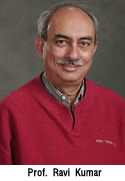 USC Professor Appointed New Dean of KAIST College of Business
Ravi Kumar, former vice dean of the Graduate and International Program at the University of Southern California, has been appointed as dean of the KAIST College of Business, the university announced on Tuesday (June 30).
Dr. Kumar has been a professor of information and operations management at the Marshall School of Business, USC. He is widely known for his research on global operations, particularly in improving operational performance through cellular design and integrated decision-making with marketing and information technology.
KAIST President Nam-Pyo Suh said: "We are fortunate to have Prof. Kumar as the new Dean of the College of Business. He has made many important contributions to the USC business school, especially in adding international dimensions to the school"s activities. He has established an impeccable reputation as a scholar and visionary. We expect that he will display great leadership in making the KAIST College of Business one of the best schools of its kind in the world."
Prof. Kumar received his bachelor degree from the Indian Institute of Technology in 1974, master degree from the University of Texas, Arlington, in 1976 and doctorate degree from Northwestern University in 1981.
His papers have been published in Management Science, Marketing Science, Journal of Economic Theory, Production and Operations Management, Journal of Operations Management and Journal of Management Information Systems. He serves as a senior editor on the Board of Production and Operations management and Operations management Educational Review.
He has won several awards for teaching excellence at both the University of Illinois Urbana-Champaign and USC. They included the Outstanding Educator Award and the Golden Apple Teaching Award.
Prof. Kumar has extensive international consulting experiences with Rolls Royce, BMW, Daimler Benz Aerospace, ABB, Ericsson, BAS Global, Motorola, Reuters, Du Pont, Sanwa Bank, Korea First Bank, Korean Air, Infosys, Acer, Shell Hong Kong and other companies.
2009.07.01 View 15652
USC Professor Appointed New Dean of KAIST College of Business
Ravi Kumar, former vice dean of the Graduate and International Program at the University of Southern California, has been appointed as dean of the KAIST College of Business, the university announced on Tuesday (June 30).
Dr. Kumar has been a professor of information and operations management at the Marshall School of Business, USC. He is widely known for his research on global operations, particularly in improving operational performance through cellular design and integrated decision-making with marketing and information technology.
KAIST President Nam-Pyo Suh said: "We are fortunate to have Prof. Kumar as the new Dean of the College of Business. He has made many important contributions to the USC business school, especially in adding international dimensions to the school"s activities. He has established an impeccable reputation as a scholar and visionary. We expect that he will display great leadership in making the KAIST College of Business one of the best schools of its kind in the world."
Prof. Kumar received his bachelor degree from the Indian Institute of Technology in 1974, master degree from the University of Texas, Arlington, in 1976 and doctorate degree from Northwestern University in 1981.
His papers have been published in Management Science, Marketing Science, Journal of Economic Theory, Production and Operations Management, Journal of Operations Management and Journal of Management Information Systems. He serves as a senior editor on the Board of Production and Operations management and Operations management Educational Review.
He has won several awards for teaching excellence at both the University of Illinois Urbana-Champaign and USC. They included the Outstanding Educator Award and the Golden Apple Teaching Award.
Prof. Kumar has extensive international consulting experiences with Rolls Royce, BMW, Daimler Benz Aerospace, ABB, Ericsson, BAS Global, Motorola, Reuters, Du Pont, Sanwa Bank, Korea First Bank, Korean Air, Infosys, Acer, Shell Hong Kong and other companies.
2009.07.01 View 15652 -
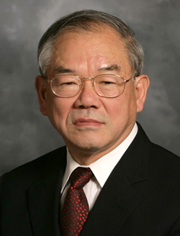 President Suh Speaks on Innovation in Asia at Glion Colloquium
KAIST President Nam-Pyo Suh stressed the importance of innovation in economic advancement in an address he delivered at the Glion Colloquium held in Glion, Switzerland, university authorities said on Wednesday (June 24).
In the speech, entitled "On Innovation Strategies: An Asian Perspective," President Suh said that for Asian countries such as China, Japan, Korea and Taiwan to continue to compete in the global economy, they must become innovators.
Over the past decade the Glion Colloquium organized by the University of Geneva has established itself as an influential international forum on higher education issues, related to research intensive universities in particular.
When it was launched in 1998, the Glion Colloquium immediately drew worldwide attention with “The Glion Declaration: the University at the Millennium,” prepared for the 1998 Paris UNESCO World Conference on Higher Education in the 21st Century.
Every two years, the colloquium brings together in Glion, Switzerland, leaders from renowned universities and higher education organizations, along with influential business and government figures, from North America, Europe and other parts of the world.
2009.06.25 View 12006
President Suh Speaks on Innovation in Asia at Glion Colloquium
KAIST President Nam-Pyo Suh stressed the importance of innovation in economic advancement in an address he delivered at the Glion Colloquium held in Glion, Switzerland, university authorities said on Wednesday (June 24).
In the speech, entitled "On Innovation Strategies: An Asian Perspective," President Suh said that for Asian countries such as China, Japan, Korea and Taiwan to continue to compete in the global economy, they must become innovators.
Over the past decade the Glion Colloquium organized by the University of Geneva has established itself as an influential international forum on higher education issues, related to research intensive universities in particular.
When it was launched in 1998, the Glion Colloquium immediately drew worldwide attention with “The Glion Declaration: the University at the Millennium,” prepared for the 1998 Paris UNESCO World Conference on Higher Education in the 21st Century.
Every two years, the colloquium brings together in Glion, Switzerland, leaders from renowned universities and higher education organizations, along with influential business and government figures, from North America, Europe and other parts of the world.
2009.06.25 View 12006 -
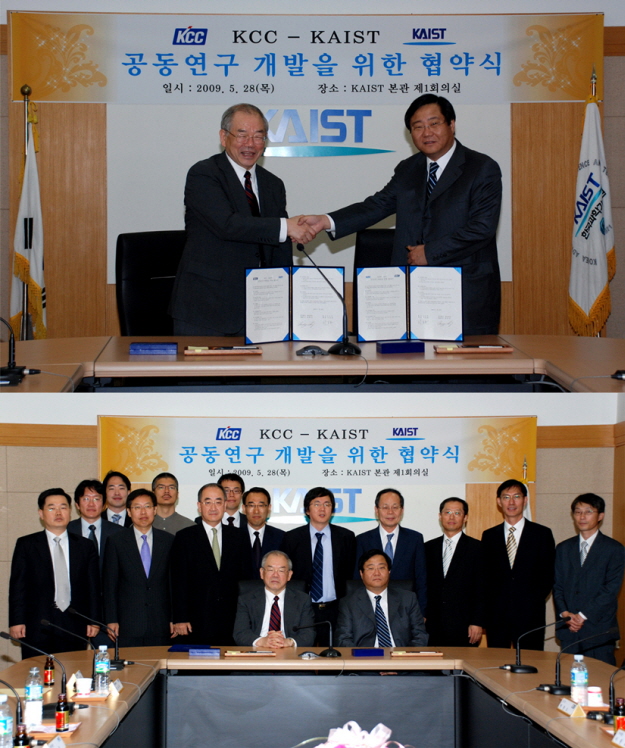 KAIST Signs Agreement for Industry-Academia Cooperation with KCC
KAIST signed an agreement for industry-academia cooperation with KCC, Korea"s leading supplier of building & industrial materials, on May 28, university sources said.
The agreement signed by KAIST President Nam-Pyo Suh and Mong-Jin Chung, Chairman of the KCC Business Group, calls for KAIST and KCC to conduct joint research for the development of new technologies in nano science, new materials areas and interdisciplinary areas.
Under the agreement, KCC will invest 5 billion won into the KAIST Institute for the NanoCentury over the next five years.
KCC Chairman Chung said: "Through this industry-academia cooperation agreement, we are seeking to give part of our profits back to community . We hope this agreement to contribute to the development of core technologies of the future in the new materials field, and nurturing specialized manpower."
2009.05.28 View 15357
KAIST Signs Agreement for Industry-Academia Cooperation with KCC
KAIST signed an agreement for industry-academia cooperation with KCC, Korea"s leading supplier of building & industrial materials, on May 28, university sources said.
The agreement signed by KAIST President Nam-Pyo Suh and Mong-Jin Chung, Chairman of the KCC Business Group, calls for KAIST and KCC to conduct joint research for the development of new technologies in nano science, new materials areas and interdisciplinary areas.
Under the agreement, KCC will invest 5 billion won into the KAIST Institute for the NanoCentury over the next five years.
KCC Chairman Chung said: "Through this industry-academia cooperation agreement, we are seeking to give part of our profits back to community . We hope this agreement to contribute to the development of core technologies of the future in the new materials field, and nurturing specialized manpower."
2009.05.28 View 15357 -
 Five Prominent Figures Appointed as KAIST Admission Officers
KAIST appointed five celebrated figures including Seung Park, former Bank of Korea governor, as admission officers on May 15, university authorities said on Thursday (May 14).
The four others are Moon-Soul Chung, founder and former CEO of Mirae Corp., who is well known as the first-generation venture entrepreneur in Korea; In-ho Lee, former Korean ambassador to Russia; Myung-ja Kim, former minister of environment; and former KAIST President Chang-sun Hong who was a National Assemblyman.
Their appointment is designed to guarantee transparency and fairness in a new undergraduate admission system. KAIST has decided to select. 150 freshmen from among 1,000 students recommended by the principals of as many general high schools across the country. The five special admission officers will participate in interviewing the recommended students. The new screening system which is introduced to broaden the field of applicants to graduates from schools other than science high schools will be implemented from the next school year.
The newly appointed admission officers will have orientation sessions on May 28-29 and then visit high schools nationwide to interview the recommended students in June and July.
KAIST set off a new trend in the admission process when President Nam-Pyo Suh announced in March that 150 students, or about 16 percent of the freshmen enrollment, would be recruited from regular high schools solely on the basis of their principals" recommendation and interview results in March.
Award-winning records at math or science competitions will not be put into account in admissions to prevent after-school tutoring aimed at winning such contests. Unveiling the new admission plan, President Suh said, "We expect the principals to recommend students with special talents or potential rather than high grades."
Established under a special law in 1971, KAIST is given full liberty to recruit freshmen students in whatever method it deems right, without being required to use the scholastic ability test scores of applicants as the basic criteria.
The socially respected admission officers will single out 300 from among the 1,000 recommended students for further review. Out of the 300, the final 150 students will be chosen through in-depth interviews by KAIST professors.
"Through years of receiving principal"s recommendations and judging the academic records of the recommended students at KAIST, we can accumulate a database on high schools nationwide. If a student from a certain high school turns out to be no good, we might not pick any more student from that school," Suh said.
Over 80 percent of students admitted to KAIST this year were graduates of elite institutions, mostly science high schools. Only 20 percent came from regular high schools. Ten percent of the 150 additional openings for regular high school graduates will be alloted to students from rural areas and another 10 percent to low-income households.
"A certain high school was not able to send even a single student to KAIST for the last 10 years. I"m sure there are talented students in that school. If we give the school a chance, it wil help improve the education environment in this country," Suh said.
2009.05.22 View 13895
Five Prominent Figures Appointed as KAIST Admission Officers
KAIST appointed five celebrated figures including Seung Park, former Bank of Korea governor, as admission officers on May 15, university authorities said on Thursday (May 14).
The four others are Moon-Soul Chung, founder and former CEO of Mirae Corp., who is well known as the first-generation venture entrepreneur in Korea; In-ho Lee, former Korean ambassador to Russia; Myung-ja Kim, former minister of environment; and former KAIST President Chang-sun Hong who was a National Assemblyman.
Their appointment is designed to guarantee transparency and fairness in a new undergraduate admission system. KAIST has decided to select. 150 freshmen from among 1,000 students recommended by the principals of as many general high schools across the country. The five special admission officers will participate in interviewing the recommended students. The new screening system which is introduced to broaden the field of applicants to graduates from schools other than science high schools will be implemented from the next school year.
The newly appointed admission officers will have orientation sessions on May 28-29 and then visit high schools nationwide to interview the recommended students in June and July.
KAIST set off a new trend in the admission process when President Nam-Pyo Suh announced in March that 150 students, or about 16 percent of the freshmen enrollment, would be recruited from regular high schools solely on the basis of their principals" recommendation and interview results in March.
Award-winning records at math or science competitions will not be put into account in admissions to prevent after-school tutoring aimed at winning such contests. Unveiling the new admission plan, President Suh said, "We expect the principals to recommend students with special talents or potential rather than high grades."
Established under a special law in 1971, KAIST is given full liberty to recruit freshmen students in whatever method it deems right, without being required to use the scholastic ability test scores of applicants as the basic criteria.
The socially respected admission officers will single out 300 from among the 1,000 recommended students for further review. Out of the 300, the final 150 students will be chosen through in-depth interviews by KAIST professors.
"Through years of receiving principal"s recommendations and judging the academic records of the recommended students at KAIST, we can accumulate a database on high schools nationwide. If a student from a certain high school turns out to be no good, we might not pick any more student from that school," Suh said.
Over 80 percent of students admitted to KAIST this year were graduates of elite institutions, mostly science high schools. Only 20 percent came from regular high schools. Ten percent of the 150 additional openings for regular high school graduates will be alloted to students from rural areas and another 10 percent to low-income households.
"A certain high school was not able to send even a single student to KAIST for the last 10 years. I"m sure there are talented students in that school. If we give the school a chance, it wil help improve the education environment in this country," Suh said.
2009.05.22 View 13895 -
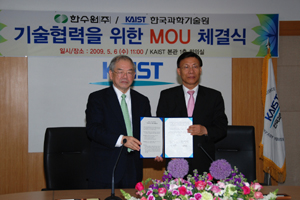 KAIST, KHNP Sign MOU on Nuclear Technology Development
KAIST signed a memorandum of understanding with the Korea Hydro & Nuclear Power Co. (KHNP) on Wednesday (May 6) to upgrade cooperation between the two organizations in nuclear power technology development.
On hand at the signing ceremony at KAIST were KAIST President Nam-Pyo Suh, KHNP President Jong-Shin Kim and other related officials.
The agreement calls for increased efficiency and synergy effect in the development of nuclear power generation by KAIST and KHNP to gain greater competitiveness in the exportation of nuclear power technologies.
KHNP is responsible for the operation of all nuclear and hydraulic power plants in Korea which supply about 40 percent of the nation"s electric power demand. It is the largest among the six power generating subsidiaries that separated from Korea Electric Power Corporation (KEPCO) in April 2001.
2009.05.07 View 13265
KAIST, KHNP Sign MOU on Nuclear Technology Development
KAIST signed a memorandum of understanding with the Korea Hydro & Nuclear Power Co. (KHNP) on Wednesday (May 6) to upgrade cooperation between the two organizations in nuclear power technology development.
On hand at the signing ceremony at KAIST were KAIST President Nam-Pyo Suh, KHNP President Jong-Shin Kim and other related officials.
The agreement calls for increased efficiency and synergy effect in the development of nuclear power generation by KAIST and KHNP to gain greater competitiveness in the exportation of nuclear power technologies.
KHNP is responsible for the operation of all nuclear and hydraulic power plants in Korea which supply about 40 percent of the nation"s electric power demand. It is the largest among the six power generating subsidiaries that separated from Korea Electric Power Corporation (KEPCO) in April 2001.
2009.05.07 View 13265 -
 Dr. Lyu Opens Oriental Health Clinic for KAIST Students on Campus
Dr. Keun-Chul Lyu, an Oriental medical scientist who donated property valued at 57.8 billion won (US$56 million) to KAIST last year, opened a health clinic and a medical research center for astronauts on the KAIST campus on Monday (April 13).
The opening of the two facilities represent the scientist"s lifelong wish to serve society by giving back his knowledge, experience and assets.
Monday"s opening ceremony was attended by 100-odd well-wishers including KAIST President Nam-Pyo Suh, Daejeon City Mayor Sung-Hyo Park and Ki-Ok Kim, President of the Korea Institute of Oriental Medicine.
Dr. Lyu"s Health Clinic which is equipped with eight units of medical treatment apparatus called "health booster" that Dr. Lyu developed will offer free medical care for KAIST students. "I would like to open the clinic as a space where students can receive medical treatment and rest anytime," Dr. Lyu said.
The research center for astronauts will focus on the researches to take care of health of space fliers and to help lessen the impact astronauts suffer when the spacecraft enters into the earth´s atmosphere.
On the same day, Dr. Lyu donated his lifetime collection of about 500 rare relic items such as Buddhist statues, ink stones and incense burners to KAIST.
2009.04.15 View 12121
Dr. Lyu Opens Oriental Health Clinic for KAIST Students on Campus
Dr. Keun-Chul Lyu, an Oriental medical scientist who donated property valued at 57.8 billion won (US$56 million) to KAIST last year, opened a health clinic and a medical research center for astronauts on the KAIST campus on Monday (April 13).
The opening of the two facilities represent the scientist"s lifelong wish to serve society by giving back his knowledge, experience and assets.
Monday"s opening ceremony was attended by 100-odd well-wishers including KAIST President Nam-Pyo Suh, Daejeon City Mayor Sung-Hyo Park and Ki-Ok Kim, President of the Korea Institute of Oriental Medicine.
Dr. Lyu"s Health Clinic which is equipped with eight units of medical treatment apparatus called "health booster" that Dr. Lyu developed will offer free medical care for KAIST students. "I would like to open the clinic as a space where students can receive medical treatment and rest anytime," Dr. Lyu said.
The research center for astronauts will focus on the researches to take care of health of space fliers and to help lessen the impact astronauts suffer when the spacecraft enters into the earth´s atmosphere.
On the same day, Dr. Lyu donated his lifetime collection of about 500 rare relic items such as Buddhist statues, ink stones and incense burners to KAIST.
2009.04.15 View 12121 -
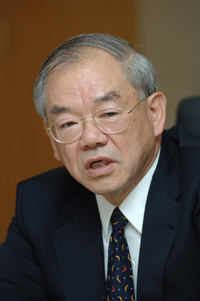 President Suh to Receive Honorary Doctorate from Romanian University
KAIST President Nam-Pyo Suh will receive an honorary doctorate degree from Babes-Bolyai University in Cluj-Napoca, Romania, in a ceremony at the university on April 3, school authorities said.
Andrei Marga, rector of the largest Romanian university, said in a letter to President Suh that the university decided to award Suh the title of Doctor Honoris Cause of Babes-Bolyai University, the highest academic honor of the university, in recognition of his "prestigious actions as academic leader of a university known worldwide and for contribution to cooperation between Romania and South Korea."
The university"s honorary doctorate is awarded to persons with illustrious achievements in the fields of science, technology, art, philosophy, and theology. Recent winners of the honor include Pope Benedict XVI; Cardinal Walter Kasper, President of the Pontifical Council for Promoting Christian Unity in Rome; Nobel Prize winners Rich Ernest of Switzerland and George Palade of the United States; philosophers Paul Ricoeur of France and Richard Rorty of the United States, among others.
The Babes-Bolyai University located in Cluj-Napoca with about 50,000 students offers education in three different languages, Romanian, Hungarian and German. It has the longest academic history in Romania, founded as a Jesuit college in 1581.
2009.04.02 View 13371
President Suh to Receive Honorary Doctorate from Romanian University
KAIST President Nam-Pyo Suh will receive an honorary doctorate degree from Babes-Bolyai University in Cluj-Napoca, Romania, in a ceremony at the university on April 3, school authorities said.
Andrei Marga, rector of the largest Romanian university, said in a letter to President Suh that the university decided to award Suh the title of Doctor Honoris Cause of Babes-Bolyai University, the highest academic honor of the university, in recognition of his "prestigious actions as academic leader of a university known worldwide and for contribution to cooperation between Romania and South Korea."
The university"s honorary doctorate is awarded to persons with illustrious achievements in the fields of science, technology, art, philosophy, and theology. Recent winners of the honor include Pope Benedict XVI; Cardinal Walter Kasper, President of the Pontifical Council for Promoting Christian Unity in Rome; Nobel Prize winners Rich Ernest of Switzerland and George Palade of the United States; philosophers Paul Ricoeur of France and Richard Rorty of the United States, among others.
The Babes-Bolyai University located in Cluj-Napoca with about 50,000 students offers education in three different languages, Romanian, Hungarian and German. It has the longest academic history in Romania, founded as a Jesuit college in 1581.
2009.04.02 View 13371 -
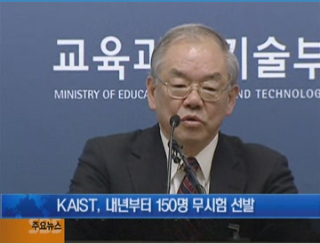 KAIST to Admit 150 Students Based on Recommendations
KAIST will select 150 students from regular high schools, excluding those from special purpose schools, on the basis of their principals" recommendations and interview results beginning in the next school year in an effort to diversify admissions, President Nam-Pyo Suh said on Thursday (March 5).
Award-winning records at math or science competitions will not be put into account in admissions to prevent after-school tutoring aimed at winning such contests.
President Suh unveiled the new admission plan at a news conference in Seoul. "We expect the principals to recommend students with special talents or potential rather than high grades," Suh said. Established under a special law in 1971, KAIST is given full liberty to recruit freshmen students in whatever method it deems right, without being required to use the scholastic ability test scores of applicants as the basic criteria.
KAIST plans to initially select 1,000 students across the country based on recommendations. Admission officers will single out 300 for further review. Out of the 300, the final 150 students will be chosen through in-depth interviews.
"Years of receiving principal recommendations would accumulate a database on high schools nationwide. If a student recommended by a principal turns out to be no good, we might not pick more students from that school," President Suh said.
Over 80 percent of students admitted to KAIST this year were graduates of elite institutions, mostly science high schools. Only 20 percent came from regular high schools. The 150 additional openings next year will be allotted to only those attending ordinary high school.
Ten percent of the 150 openings will be assigned to students from rural areas and another 10 percent will go to students from low-income households.
"One high school was not able to send even a single student to KAIST for the last 10 years. I"m sure there are talented students in that school. If we give the school a chance, the education system will be upgraded," President Suh said.
KAIST-affiliated Korea Science Academy, a Busan-based high school for gifted students, will also adopt similar admission policy of recruiting students solely on the basis on recommendation and interview results from 2011.
2009.03.10 View 12831
KAIST to Admit 150 Students Based on Recommendations
KAIST will select 150 students from regular high schools, excluding those from special purpose schools, on the basis of their principals" recommendations and interview results beginning in the next school year in an effort to diversify admissions, President Nam-Pyo Suh said on Thursday (March 5).
Award-winning records at math or science competitions will not be put into account in admissions to prevent after-school tutoring aimed at winning such contests.
President Suh unveiled the new admission plan at a news conference in Seoul. "We expect the principals to recommend students with special talents or potential rather than high grades," Suh said. Established under a special law in 1971, KAIST is given full liberty to recruit freshmen students in whatever method it deems right, without being required to use the scholastic ability test scores of applicants as the basic criteria.
KAIST plans to initially select 1,000 students across the country based on recommendations. Admission officers will single out 300 for further review. Out of the 300, the final 150 students will be chosen through in-depth interviews.
"Years of receiving principal recommendations would accumulate a database on high schools nationwide. If a student recommended by a principal turns out to be no good, we might not pick more students from that school," President Suh said.
Over 80 percent of students admitted to KAIST this year were graduates of elite institutions, mostly science high schools. Only 20 percent came from regular high schools. The 150 additional openings next year will be allotted to only those attending ordinary high school.
Ten percent of the 150 openings will be assigned to students from rural areas and another 10 percent will go to students from low-income households.
"One high school was not able to send even a single student to KAIST for the last 10 years. I"m sure there are talented students in that school. If we give the school a chance, the education system will be upgraded," President Suh said.
KAIST-affiliated Korea Science Academy, a Busan-based high school for gifted students, will also adopt similar admission policy of recruiting students solely on the basis on recommendation and interview results from 2011.
2009.03.10 View 12831 -
 Workshop on High Risk, High Return Projects Slated for Jan. 14
KAIST will hold the first workshop on "high risk, high return" projects at its Creative Learning Center on Jan. 14.
Under the leadership of President Nam-Pyo Suh, KAIST has instituted high risk, high return research-support programs to encourage creativity and innovation in research activities. Professors and graduate students can apply for HRHR funding any time they have creative ideas that they believe deserve support by the university"s HRHR program.
Once they prove the validity of their ideas, they can then go for the special HRHR funding. The HRHR support does not prevent researcers from applying for any outside sponsorship. Although the program has been in existence for only a short time, the results are encouraing, university authorities said.
Research projects currently underway on such innovative ideas as "transforming ice to icy fuel and ice-like magnets," "mini-lunar lander mission," "mobile floating harbor for increased container handling capacity" and "marine oil spill protection robot design."
During the workshop, a total of 44 research subjects which were picked up in 2008 will be presented. Presentations will be made focused on the three categories; idea, research procedures and current status. Among the 44 research ideas, 40 came from professors and four from students. Posters showing the research content of the 44 subjects will be on display also.
2009.01.08 View 12449
Workshop on High Risk, High Return Projects Slated for Jan. 14
KAIST will hold the first workshop on "high risk, high return" projects at its Creative Learning Center on Jan. 14.
Under the leadership of President Nam-Pyo Suh, KAIST has instituted high risk, high return research-support programs to encourage creativity and innovation in research activities. Professors and graduate students can apply for HRHR funding any time they have creative ideas that they believe deserve support by the university"s HRHR program.
Once they prove the validity of their ideas, they can then go for the special HRHR funding. The HRHR support does not prevent researcers from applying for any outside sponsorship. Although the program has been in existence for only a short time, the results are encouraing, university authorities said.
Research projects currently underway on such innovative ideas as "transforming ice to icy fuel and ice-like magnets," "mini-lunar lander mission," "mobile floating harbor for increased container handling capacity" and "marine oil spill protection robot design."
During the workshop, a total of 44 research subjects which were picked up in 2008 will be presented. Presentations will be made focused on the three categories; idea, research procedures and current status. Among the 44 research ideas, 40 came from professors and four from students. Posters showing the research content of the 44 subjects will be on display also.
2009.01.08 View 12449 -
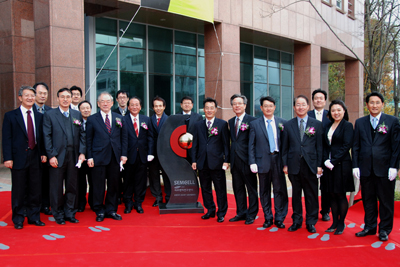 KAIST Opens Cell Bench Research Center
KAIST opened a cell bench research center on the campus on Monday, Nov. 17, as a joint project with Samsung Electric Co. and Samsung Medical Center.
On hand at the opening ceremony were about 100 persons from the three organizations, including KAIST President Nam-Pyo Suh, Samsung Electric"s Chief Technology Officer (CTO) Byung-Cheon Koh and Samsung Medical Center Vice President Hyo-Geun Lim.
The newly-opened research center will be involved in the development of individually-tailored anti-cancer medicine using bio-inspired cell chips and technologies for clinical applications. Prof. Young-Ho Cho of the Department of Bio and Brain Engineering was named director of the research center.
"Top-notch professionals from the electronic industry, academia and the medical community have gathered together to establish this research center. We expect the center will open a new path for the science and technology community and the industry to combine their strengths and develop innovative anti-cancer therapeutics," said KAIST President Nam-Pyo Suh at the opening ceremony.
"The development of bio-cell chip technology represents a new challenge for the Samsung Electric which has focused on information technologies thus far. Through cooperation with KAIST and Samsung Medical Center, we expect to be able to develop a simple and efficient cure for cancer patients," commented Samsung Electric CTO Byung-Cheon Koh.
The research center will be initially concentrating on the development of cell chips for lung cancer, one of the primary causes of death for Koreans.
2008.11.17 View 18824
KAIST Opens Cell Bench Research Center
KAIST opened a cell bench research center on the campus on Monday, Nov. 17, as a joint project with Samsung Electric Co. and Samsung Medical Center.
On hand at the opening ceremony were about 100 persons from the three organizations, including KAIST President Nam-Pyo Suh, Samsung Electric"s Chief Technology Officer (CTO) Byung-Cheon Koh and Samsung Medical Center Vice President Hyo-Geun Lim.
The newly-opened research center will be involved in the development of individually-tailored anti-cancer medicine using bio-inspired cell chips and technologies for clinical applications. Prof. Young-Ho Cho of the Department of Bio and Brain Engineering was named director of the research center.
"Top-notch professionals from the electronic industry, academia and the medical community have gathered together to establish this research center. We expect the center will open a new path for the science and technology community and the industry to combine their strengths and develop innovative anti-cancer therapeutics," said KAIST President Nam-Pyo Suh at the opening ceremony.
"The development of bio-cell chip technology represents a new challenge for the Samsung Electric which has focused on information technologies thus far. Through cooperation with KAIST and Samsung Medical Center, we expect to be able to develop a simple and efficient cure for cancer patients," commented Samsung Electric CTO Byung-Cheon Koh.
The research center will be initially concentrating on the development of cell chips for lung cancer, one of the primary causes of death for Koreans.
2008.11.17 View 18824 -
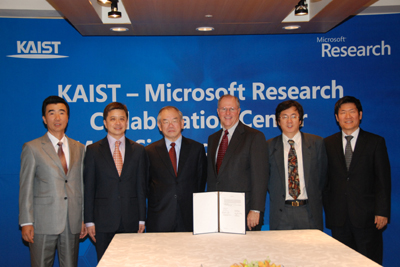 KAIST, Microsoft Research to Set up Research Collaboration Center
KAIST, Korea"s premier institution for science and technology research and education, and Microsoft Research (MSR), the research arm of Microsoft Corp, signed a memorandum of understanding (MOU) to establish a joint research collaboration center in Korea on Oct. 20.
The research collaboration center to be located at the KAIST campus in the Daedeok science and technology town 150 kilometers south of Seoul will be dedicated to promoting joint researches, curriculum innovation, talent fostering and academic exchange in the Asian region.
The MOU signing ceremony at the Westin Chosun Hotel in Seoul was attended by President Nam-Pyo Suh and Vice President Soon-Heung Chang from KAIST, and Craig Mundie, Chief Research and Strategy Officer of Microsoft Corp, and Hsiao-Wuen Hon, Managing Director of MSR Asia from Microsoft.
“We are excited to be working so closely with Microsoft Research,” KAIST President Suh said. “This is the first of many alliances we hope to establish with the world’s industrial leaders that will enable us to resolve some of the toughest problems in computer science and accelerate the next generation of innovation in computing technology and its application in other scientific researches.”
Dr. Hon said: “For over 10 years, Microsoft Research has been committed to working with leading universities throughout Asia to spur computer science research and to strengthen Asia’s knowledge economies by helping foster their capabilities. The Microsoft-KAIST Research Collaboration Center demonstrates our continued efforts to strengthen relations with universities in Korea and build new partnerships with academia here.”
In the last three years, Microsoft Research and KAIST have engaged in close collaboration through research projects, student support programs, and various academic exchange activities. One of the major projects was to construct software development library specifically dedicated to systems biology. A number of excellent students from KAIST participated in the internship program at Microsoft Research in Beijing, China and Redmond, United States.
The establishment of the Microsoft-KAIST research collaboration center will bring the collaborative relations between KAIST and MSR to a new level. The center will provide a platform which unites the innovative minds of KAIST and Microsoft Research to develop technologies that will impact the way people live, learn, work, and play, a KAIST spokesman said.
2008.10.30 View 19243
KAIST, Microsoft Research to Set up Research Collaboration Center
KAIST, Korea"s premier institution for science and technology research and education, and Microsoft Research (MSR), the research arm of Microsoft Corp, signed a memorandum of understanding (MOU) to establish a joint research collaboration center in Korea on Oct. 20.
The research collaboration center to be located at the KAIST campus in the Daedeok science and technology town 150 kilometers south of Seoul will be dedicated to promoting joint researches, curriculum innovation, talent fostering and academic exchange in the Asian region.
The MOU signing ceremony at the Westin Chosun Hotel in Seoul was attended by President Nam-Pyo Suh and Vice President Soon-Heung Chang from KAIST, and Craig Mundie, Chief Research and Strategy Officer of Microsoft Corp, and Hsiao-Wuen Hon, Managing Director of MSR Asia from Microsoft.
“We are excited to be working so closely with Microsoft Research,” KAIST President Suh said. “This is the first of many alliances we hope to establish with the world’s industrial leaders that will enable us to resolve some of the toughest problems in computer science and accelerate the next generation of innovation in computing technology and its application in other scientific researches.”
Dr. Hon said: “For over 10 years, Microsoft Research has been committed to working with leading universities throughout Asia to spur computer science research and to strengthen Asia’s knowledge economies by helping foster their capabilities. The Microsoft-KAIST Research Collaboration Center demonstrates our continued efforts to strengthen relations with universities in Korea and build new partnerships with academia here.”
In the last three years, Microsoft Research and KAIST have engaged in close collaboration through research projects, student support programs, and various academic exchange activities. One of the major projects was to construct software development library specifically dedicated to systems biology. A number of excellent students from KAIST participated in the internship program at Microsoft Research in Beijing, China and Redmond, United States.
The establishment of the Microsoft-KAIST research collaboration center will bring the collaborative relations between KAIST and MSR to a new level. The center will provide a platform which unites the innovative minds of KAIST and Microsoft Research to develop technologies that will impact the way people live, learn, work, and play, a KAIST spokesman said.
2008.10.30 View 19243